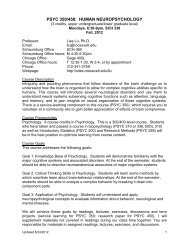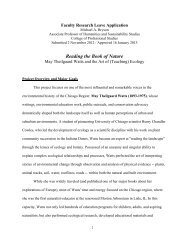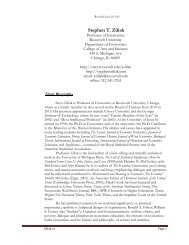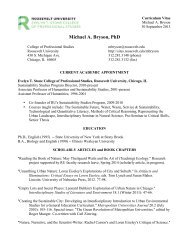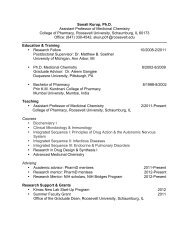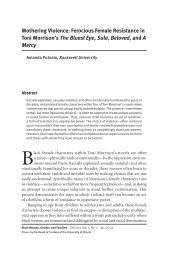Social Insurance and Public Assistance
public-assistance-welfare-reform-colonial-times-to-the-present-ziliak ...
public-assistance-welfare-reform-colonial-times-to-the-present-ziliak ...
You also want an ePaper? Increase the reach of your titles
YUMPU automatically turns print PDFs into web optimized ePapers that Google loves.
SOCIAL WELFARE PROGRAMS Series Bf708–716 809<br />
TABLE Bf708–716 Low-Income Home Energy <strong>Assistance</strong> program – obligations <strong>and</strong> households receiving assistance:<br />
1982–1996<br />
Contributed by Price V. Fishback <strong>and</strong> Melissa A. Thomasson<br />
Estimated home energy assistance obligations for<br />
Households receiving assistance for<br />
Weatherization<br />
Weatherization<br />
<strong>and</strong> energy-<br />
<strong>and</strong> energy-<br />
Energy crisis intervention<br />
Energy crisis related home related home<br />
Heating Cooling intervention repair Heating Cooling Winter Summer repair<br />
Bf708 Bf709 Bf710 Bf711 Bf712 Bf713 Bf714 Bf715 Bf716<br />
Year Dollars Dollars Dollars Dollars Number Number Number Number Number<br />
1982 1,124,476,630 51,498,572 138,941,133 136,195,046 5,990,176 1,075,061 707,123 — 430,830<br />
1983 1,343,267,155 33,020,830 191,771,756 195,463,612 6,414,448 529,036 972,894 25,342 482,620<br />
1984 1,372,772,591 32,374,067 225,795,893 186,662,906 6,443,637 537,598 963,743 28,841 180,748<br />
1985 1,466,721,924 29,135,118 191,407,205 227,096,051 6,545,616 511,333 857,809 27,196 217,864<br />
1986 1,351,903,078 35,620,945 199,178,003 193,420,839 6,359,924 535,553 951,945 114,194 191,316<br />
1987 1,280,302,113 29,581,262 197,719,071 220,419,633 6,495,409 366,721 1,060,425 60,797 172,372<br />
1988 1,145,560,993 21,151,405 190,046,023 170,292,505 5,827,481 309,044 981,775 57,750 156,770<br />
1989 1,017,024,757 12,341,113 187,442,779 147,952,928 5,595,268 126,977 890,616 20,384 142,584<br />
1990 1,030,150,903 25,007,676 188,844,316 133,479,484 5,459,631 358,823 1,058,067 37,340 148,104<br />
1991 1,098,583,280 27,416,776 220,795,517 129,279,737 5,769,346 374,483 1,004,634 39,399 127,587<br />
1992 990,903,081 22,645,002 197,218,623 134,816,010 5,906,292 384,468 950,275 25,570 106,066<br />
1993 948,596,196 22,274,975 183,189,522 146,444,590 5,282,993 143,279 956,435 47,169 111,295<br />
1994 1,062,552,111 24,862,636 225,583,805 214,342,289 5,663,040 145,684 1,127,832 24,532 126,086<br />
1995 884,846,144 43,883,481 212,713,182 159,076,150 5,147,619 341,041 932,263 77,915 102,817<br />
1996 696,801,144 17,597,204 167,622,219 135,835,358 3,974,152 128,538 804,560 59,992 91,503<br />
Source<br />
U.S. <strong>Social</strong> Security Administration, <strong>Social</strong> Security Bulletin: Annual Statistical<br />
Supplement (1999), Tables 9.J1 <strong>and</strong> 9.J3, pp. 346, 350; a legislative history<br />
of the Low-Income Home Energy <strong>Assistance</strong> program (LIHEAP) is on<br />
pp. 128–9.<br />
Documentation<br />
Under LIHEAP, block grants administered by Health <strong>and</strong> Human Services<br />
(HHS) are provided to the states to assist eligible households to meet home<br />
energy expenses. In addition to the fifty states, grants were provided in fiscal<br />
year 1995 to the District of Columbia, the Commonwealth of Puerto Rico,<br />
five insular areas, <strong>and</strong> 123 Indian tribes or tribal organizations.<br />
The unit of eligibility for energy assistance is the household, defined as any<br />
individual or group of individuals who are living together as one economic<br />
unit for which residential energy is customarily purchased in common, either<br />
directly or through rent. Under the Act, households can be eligible for assistance<br />
on the basis of income, or are categorically eligible if they already<br />
receive Aid to Families with Dependent Children (replaced by the Temporary<br />
<strong>Assistance</strong> for Needy Families program), Supplemental Security Income,<br />
food stamps, or need-tested veterans’ benefits. To be eligible on the basis of<br />
income, households must have incomes less than either 150 percent of the<br />
income guidelines or 60 percent of the state’s median income, whichever is<br />
greater. As of 1995, no household may be excluded from eligibility on the<br />
basis of income alone if household income is less than 110 percent of the<br />
poverty guidelines.<br />
States make payments directly to eligible households or to home energy<br />
suppliers on behalf of eligible households. Payments can be provided in cash,<br />
fuel, or prepaid utility bills or as vouchers, stamps, or coupons that can be<br />
used in exchange for energy supplies. Payments are to vary in such a way that<br />
the highest level of assistance is furnished to households with the lowest income<br />
<strong>and</strong> the highest energy costs in relation to income, taking into account<br />
family size.<br />
With respect to the series that are reported for the number of households<br />
receiving assistance, note that an unduplicated total of households<br />
assisted cannot be derived from the data because the same household may<br />
be included under more than one type of assistance. In addition, the data<br />
for the number of households that received heating <strong>and</strong> cooling assistance<br />
include households that received combined heating <strong>and</strong> cooling assistance<br />
in Arizona, California, <strong>and</strong> Florida, <strong>and</strong> households in Hawai’i that received<br />
assistance without differentiation between heating <strong>and</strong> cooling assistance.<br />
Further, the total number of households receiving energy crisis intervention<br />
in winter includes households that received expedited heating assistance in<br />
Maryl<strong>and</strong>, Massachusetts, <strong>and</strong> New Hampshire.



